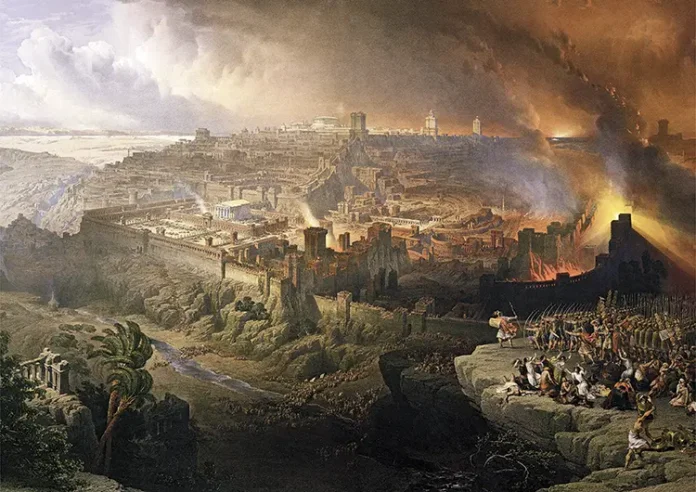November 16 – 33rd Sunday in Ordinary Time
Two moments are crucial in a man’s existence: his birth and his departure from this world. The banished children of Eve experience exceptional rest in both circumstances: upon entering life, the child is placed in a cradle, a place associated with hope for what it will become in the future; upon leaving the earthly condition, we all receive a coffin, a “dwelling” linked to the memory of our achievements.
All human history must be interpreted in terms of its end: the judgement in which God will separate the wicked from the good, and will punish some and reward others, according to their works (cf. Rom 2:6).
When, on the Tuesday before His Passion, the Redeemer left the Temple of Jerusalem for the last time, His disciples marveled at the beauty of that edifice, which had been rebuilt by Herod over forty years. The white marble, adorned with the perennial brilliance of gold, showed all its magnificence under the last rays of the setting sun.
Based on this act of merely human admiration – for the external opulence of the building concealed the infidelity rampant within it – the Divine Master urged them to consider the end: “All that you see here – the days will come when there will not be left a stone upon another stone that will not be thrown down” (Lk 21:6).
He announced with prophetic words the end of a world.
In fact, Jesus’ statement touched on two areas of particular interest: the end of the Temple in Jerusalem and the end of the world. His words remain mysterious until today, but this Sunday’s readings make it sufficiently clear that Our Lord’s intention was to prepare us for the end.
History has already witnessed the “end of many worlds”. One need only recall the twilight of the Greek or Roman empires. Even in the third century, St. Cyprian of Carthage unveiled the sign of the times that heralded the end of his world:
“There is a lack of farmers in the fields, sailors on the seas, soldiers in the barracks, honesty in the forum, justice in the courts, solidarity in friendships, skill in the arts, discipline in customs”…1
Taking into account the current state of our world, one can conjecture that Providence is already preparing a new cradle of hope for the civilization that is to be born of authentic love for the Kingdom of God.
The true vision of history analyses everything in terms of its protagonist, who is the Saviour, and His Mystical Body, the Church. In order not to share the fate of the Temple of Jerusalem, let us have Jesus Christ as the cornerstone of our spiritual edifice. By doing so, we will hear the comforting words of the Redeemer:
“Not a hair on your head will be destroyed. By your perseverance you will secure your lives” (Lk 21:18-19). ◊
Notes
1 ST. CYPRIAN OF CARTHAGE. Ad Demetrianum, c.3: PL 4, 546.



Thank you, Father Thiago, for these good words.